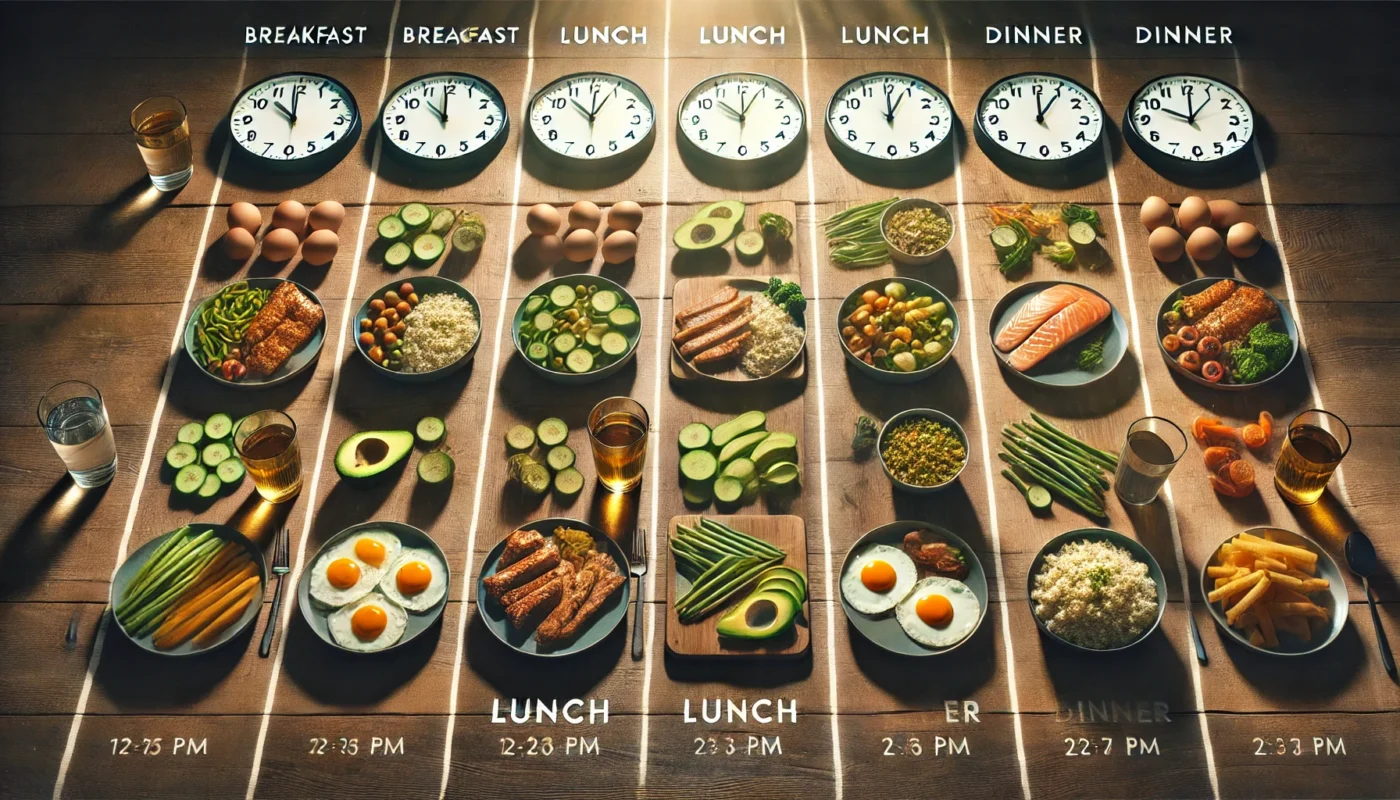Protein timing involves consuming protein at specific intervals to enhance muscle protein synthesis (MPS), which is the process your body uses to build muscle. Studies have shown that MPS rates are elevated after exercise and can be further enhanced by consuming protein shortly after a workout. This post-exercise period, often termed the “anabolic window,” is considered optimal for protein consumption.
You may also like: High Protein Foods to Fuel Workouts

Understanding Muscle Protein Synthesis
Muscle Protein Synthesis (MPS) is the mechanism through which your body repairs and builds muscle fibers. Exercise, particularly resistance training, initiates MPS, but the presence of amino acids from dietary protein is essential to maximize this process. The rate of MPS can vary based on factors such as the type of exercise, the individual’s age, and the protein source consumed.
The Anabolic Window: Myth or Reality?
The anabolic window has been a subject of debate among fitness enthusiasts and researchers alike. While early studies suggested a short window of 30 minutes to 2 hours post-exercise for protein consumption, more recent research indicates that the window may extend several hours beyond this initial period. Nonetheless, consuming protein soon after a workout can still provide benefits, particularly when combined with carbohydrates to replenish glycogen stores and enhance recovery.
More recent studies have expanded the understanding of the anabolic window, suggesting it may span up to 24 hours post-exercise. This broader timeframe gives more flexibility in protein intake, allowing individuals to focus on total daily protein consumption as well. However, immediate post-workout nutrition can still be beneficial for those seeking to optimize recovery and muscle protein synthesis.
The Role of Protein Quality and Digestion Rate
The type of protein consumed can affect the timing strategy. Fast-digesting proteins like whey can quickly deliver amino acids to muscles, making them ideal for post-workout consumption. Conversely, slow-digesting proteins like casein can provide a prolonged release of amino acids, which can be advantageous when consumed at other times, such as before bed.
Practical Strategies for Optimal Protein Timing
While science provides valuable insights into protein timing, practical application is key. Here are some strategies to help you optimize your protein intake:
Pre-Workout Protein
Consuming protein before a workout can provide a steady supply of amino acids during exercise, potentially reducing muscle breakdown and enhancing performance. Aim to consume a balanced meal containing protein and carbohydrates 1-3 hours before exercising.
Choosing the right type of protein and meal composition for pre-workout nutrition is crucial. Foods such as chicken, fish, or plant-based proteins like tofu can serve as excellent sources of pre-exercise protein. Including complex carbohydrates like whole grains or sweet potatoes will offer sustained energy for your workout.
Post-Workout Protein
After exercise, focus on consuming a high-quality protein source, such as whey protein, within 30 minutes to 2 hours. This can be in the form of a protein shake, yogurt, or a balanced meal. Pairing protein with carbohydrates can further enhance recovery by replenishing glycogen stores.
For those on the go, a protein shake can be a convenient option. However, if time allows, a post-workout meal with lean protein, such as grilled chicken or fish, alongside rice or potatoes, can be equally effective. This combination supports muscle repair while restoring energy levels.
Evening Protein
Casein protein, a slow-digesting protein found in dairy products, can be particularly beneficial when consumed before bed. It provides a sustained release of amino acids throughout the night, supporting muscle repair and growth during sleep.
Incorporating casein-rich foods like cottage cheese or Greek yogurt before sleep can help maintain a positive protein balance overnight. This strategy can be particularly advantageous for athletes undergoing intense training or individuals looking to maximize muscle growth.

What Happens If You Eat Protein Without Working Out?
A common question among those interested in fitness is whether eating protein without working out can still benefit muscle growth. While protein is essential for maintaining muscle mass and supporting overall health, consuming excess protein without exercise is unlikely to result in significant muscle gains. Instead, the excess protein may be used for energy or stored as fat.
Does Protein Build Muscle Without Working Out?
While protein is a vital component of muscle tissue, it cannot build muscle in isolation. Resistance training or other forms of exercise are necessary to stimulate MPS and promote muscle growth. Without the stimulus provided by exercise, consuming additional protein alone will not lead to increased muscle mass.
It’s also important to consider the body’s protein requirements for maintaining overall health. Even without intense exercise, protein is vital for various bodily functions, including immune support and enzyme production. Thus, maintaining adequate protein intake is crucial, but it’s the synergy with exercise that drives muscle growth.
The Role of Protein in Weight Management
Protein can play a role in weight management, even without a workout regimen. High-protein diets can increase satiety and help regulate appetite, potentially supporting weight loss or maintenance efforts. However, balance is key, and protein should be consumed as part of a varied and nutritious diet to avoid the pitfalls of excessive intake.
Balancing Protein Intake with Holistic Health Approaches
As a health enthusiast, it’s important to balance protein intake with other holistic health strategies. Here are some additional tips to consider:
Diversify Your Protein Sources
Incorporate a variety of protein sources into your diet, including plant-based options like legumes, nuts, and seeds. This not only provides a range of amino acids but also supports a more sustainable and balanced diet.
Plant-based proteins are often rich in fiber and other nutrients beneficial for heart health and digestion. Combining different plant proteins, such as beans and rice, can ensure a complete amino acid profile, supporting muscle maintenance and growth.
Focus on Whole Foods
While protein supplements can be convenient, prioritize whole foods to ensure you’re getting a range of nutrients. Foods like lean meats, fish, dairy, and legumes offer additional vitamins, minerals, and fiber.
Whole foods provide a wealth of phytonutrients and antioxidants, which can enhance recovery and reduce inflammation. Including a variety of colorful fruits and vegetables alongside protein sources is an excellent way to promote overall health and wellness.
Listen to Your Body
Ultimately, your body’s needs are unique. Pay attention to how you feel after consuming protein and adjust your intake accordingly. This personalized approach can help you fine-tune your protein timing strategy for optimal results.
Tracking your dietary intake and physical performance can provide insights into how different protein sources and timing affect your body. Journaling these observations can guide adjustments to your nutrition plan, ensuring it aligns with your health and fitness objectives.

Conclusion
Protein timing is a nuanced and complex aspect of nutrition that plays a critical role in muscle development and overall health. By understanding the science behind protein timing and applying practical strategies, you can enhance your fitness journey and achieve your health goals. Remember, while protein is important, it is one piece of the puzzle in a holistic approach to health and wellness. By balancing protein intake with a diverse diet, regular exercise, and mindful eating practices, you can support your body’s needs and optimize your health outcomes.
Protein Timing, Muscle Protein Synthesis, Anabolic Window, Post-Workout Nutrition, Pre-Workout Protein, Protein Quality, Weight Management, Holistic Health, Plant-Based Protein, Whole Foods, Casein Protein, Whey Protein, Fitness Nutrition, Muscle Growth, Recovery Strategies
Further Reading:
Here’s Exactly How Much Protein You Need
How Does Eating Protein Help You Build Muscle?
Here’s How Much Protein You Need in a Day to Build Muscle
Important Note: The information contained in this article is for general informational purposes only, and should not be construed as health or medical advice, nor is it intended to diagnose, prevent, treat, or cure any disease or health condition. Before embarking on any diet, fitness regimen, or program of nutritional supplementation, it is advisable to consult your healthcare professional in order to determine its safety and probable efficacy in terms of your individual state of health.
Regarding Nutritional Supplements Or Other Non-Prescription Health Products: If any nutritional supplements or other non-prescription health products are mentioned in the foregoing article, any claims or statements made about them have not been evaluated by the U.S. Food and Drug Administration, and such nutritional supplements or other health products are not intended to diagnose, treat, cure, or prevent any disease.

